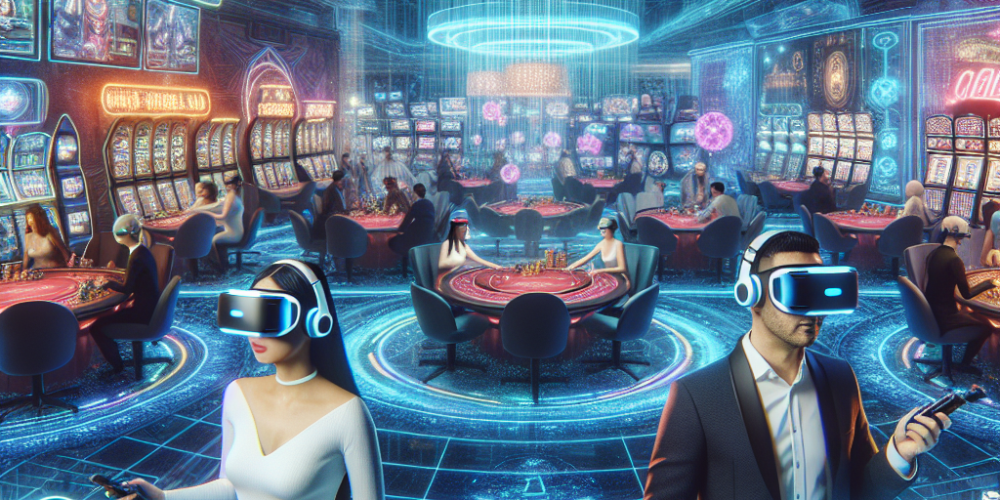In a groundbreaking development that is set to redefine gaming and entertainment, the global casino industry is witnessing a significant shift with the emergence and acceleration of Virtual Reality (VR) casinos in 2023. As technology and digital innovation continue to evolve, traditional gambling venues are increasingly embracing VR to create immersive, interactive gaming experiences that attract a younger demographic and tech-savvy gamblers.
The concept of VR casinos isn’t entirely new but has reached new heights of implementation and popularity this year. These platforms offer a simulated gaming environment that replicates the experience of a physical casino, allowing players to engage in games like blackjack, poker, slots, and roulette in a fully immersive digital setting. What differentiates this year’s surge from previous attempts is the improved quality of VR technology and greater accessibility to VR headsets, combined with a heightened interest in digital leisure activities post-pandemic.
Leading the charge in this innovative frontier are tech giants and specialized gaming companies who are investing billions into developing more sophisticated VR gaming software and user-friendly equipment. One notable example is the recent launch of “Casino VR: Poker,” a game that offers full-body avatars and voice chat, designed to mimic the social experience of casino gambling in a virtual space. This game, along with others being rapidly developed, is not only enhancing user engagement but is also setting a new standard for virtual gambling experiences.
Market analysts project that VR casinos will generate substantial revenue in the coming years, potentially revitalizing an industry that saw significant losses during the COVID-19 lockdowns and facing ongoing challenges like regulatory restrictions and reduced tourist footfall. According to a recent report by Future Market Insights, the VR gambling industry is expected to grow at a compound annual growth rate (CAGR) of over 17% between 2023 and 2030. This surge is supported by an increasing number of legal jurisdictions softening regulations around online gambling, especially in the United States and Europe, providing a larger legal market for VR casino operations.
Furthermore, social interaction, which is a significant component of gambling at traditional casinos, is effectively translated into the virtual environment, offering a community aspect that has been especially appealing in a world still grappling with the social limitations imposed by the pandemic. VR casinos allow players to interact with each other in real-time, adding a layer of social connectivity often missing from standard online gambling experiences.
However, this rapid growth also ushers in new challenges, particularly in the areas of cybersecurity and regulatory compliance. VR casinos collect and store massive amounts of data, including sensitive personal information, necessitating robust cybersecurity measures to prevent data breaches and fraud. Regulatory bodies are also scrambling to keep up with the technology to ensure fair play and prevent the misuse of these platforms for money laundering or other illegal activities.
Despite these challenges, the potential of VR casinos extends beyond pure entertainment. Many in the industry see virtual reality gambling as an opportunity to train and educate dealers and staff, create controlled environments for responsible gambling research, and even promote tourism through virtual tours of famous casinos and exclusive gaming rooms.
As we look towards the future, it is clear that virtual reality is transforming the gaming and entertainment landscape. Casinos that adopt this technology early might well be setting the stage for the next generation of gambling, providing thrilling and engaging experiences while meeting the expectations of a new era of consumers. Industry stakeholders, including gaming authorities, casino operators, and technology developers, are advised to closely monitor this trend and innovate responsibly, ensuring a secure and equitable gaming environment for all players.
In conclusion, as VR technology continues to mature and become more widespread, virtual reality casinos are likely to become a prominent feature of the global gambling industry. This shift not only demonstrates the evolving nature of gaming technology but also signals a significant transformation in how entertainment and leisure activities are consumed in the digital age.

David Garato is a luminary in gaming journalism, renowned for peeling back the curtain on the gaming world with his witty and insightful commentary. A decade into weaving stories from the pixelated edges of indie games to the expansive universes of AAA titles, David’s work is a thrilling blend of analysis and adventure. When not writing, he’s live-streaming, sharing his gaming exploits with an engaged and growing audience. David doesn’t just write about games; he lives them, making him a trusted guide in the gaming community.


